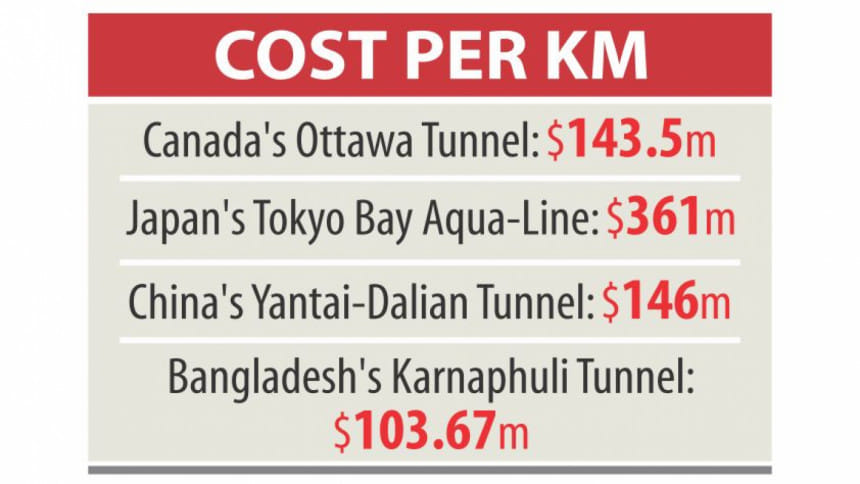Chinese firm to get work for Karnaphuli tunnel

China Communication Construction Company is set to win the work for construction of a two-lane tunnel underneath the Karnaphuli river.
The Chinese builder will get Tk 706 million for its services, and the Bridges Division will place the proposal to sign a commercial contract with the company, at today's meeting of the cabinet committee on economic affairs.
The total project outlay will cross $1 billion, which is less than the cost incurred to build tunnels in Canada, Japan and China, according to the Bridges Division's evaluation.
The cost of building the Karnaphuli tunnel per kilometre would come to $103.67 million, according to the proposal sent in by China Communication in February, which was pored over by three independent consultants.
Canada's Ottawa Tunnel cost $143.50 million per kilometre, Japan's Tokyo Bay Aqua-Line $361 million and China's Yantai-Dalian Tunnel $146 million.
On May 23, a high-level meeting discussed the price and other issues related to the Chinese offer and came to the conclusion that the price quotation was acceptable. Earlier in 2011, China Communication and its partner Ove Arup & Partners Hong Kong conducted a feasibility study on the Karnaphuli tunnel.
The same company is now going to build the tunnel and questions were raised as to whether it violated the government's procurement rules.
The tunnel will be constructed with soft loans from China and the Chinese government has nominated China Communication as the builder, said an official from the Bridges Division.
“A major condition of the loan was that China Communication gets the work,” he said, adding that the commercial contract is likely to be signed in China later this month.
Earlier, in January, Road Transport and Bridges Minister Obaidul Quader said construction work for the tunnel under the river Karnaphuli will begin by the year-end and will be completed within a four-year timescale. The tunnel will significantly facilitate transit traffic, relieve the existing bridges of traffic pressure and promote regional economic growth, according to the government study.
It will also provide convenient transport conditions for the planned deep sea port.
The tunnel, which is a first-of-its-kind in Bangladesh, will improve the Dhaka-Chittagong-Cox's Bazar highway network. It can later be linked to the planned Asian Highway Network, enabling road connections with Myanmar and India.
The tunnel would also attract downtown population in the east side and promote “One City and Two Towns” development model adopted by Shanghai, the largest city in China.
During the prime minister's visit to China in June last year, an agreement was signed between the two countries' communications ministries regarding the tunnel project.
About $300 million will be required for land acquisition and rehabilitation for the tunnel, to be provided from the government's own fund.

 For all latest news, follow The Daily Star's Google News channel.
For all latest news, follow The Daily Star's Google News channel. 



Comments